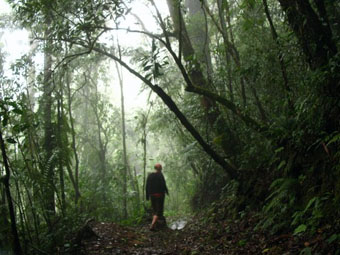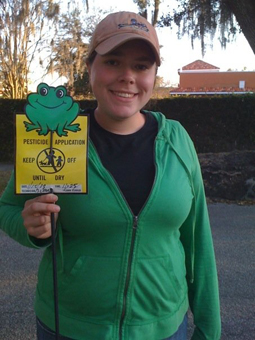
| Taegan McMahon Postdoc |
||
Dendrobates pumilio
Taegan in Costa Rica
Taegan collecting frog-biting flies in Panama
Sage advice from Taegan! |
Contact Information Office: SCA 322 Ph.D. Biology, University of South Florida, 2008-2013
|
|
Research My research integrates ecology, parasitology, and ecotoxicology. My interest in both applied and fundamental ecology is reflected in my research, which highlights both anthropogenic and non-anthropogenic factors that affect community structure and species interactions, with an emphasis on aquatic communities and host-pathogen interactions. I study amphibians because they are considered the most threatened vertebrate taxon on the planet with over one third of amphibian species listed as threatened. Publications McMahon, T.A., Halstead, N.T*, Johnson, S., Raffel, T.R., Romansic, J.M., Crumrine, P.W., Rohr, J.R. 2012. Fungicide-induced declines of freshwater biodiversity modify ecosystem functions and services. Ecology Letters 15: 714-722 McMahon, T.A., Brannelly, L.A, Chatfield, M.W.H., Johnson, P.T.J., Joseph, M.B., McKenzie, V.J., Richards-Zawacki, C.L., Venesky, M.D., Rohr, J.R. 2013. Chytrid fungus Batrachochytrium dendrobatidis has nonamphibian hosts and releases chemicals that cause pathology in the absence of infection. Proceedings of the National Academy of Sciences of the United States of America 110: 210-215 Raffel, T.R., Romansic, J.M., Halstead, N.T., McMahon, T.A., Venesky, M.D. , Rohr, J.R. 2013. Disease and thermal acclimation in a more variable and unpredictable climate. Nature Climate Change 3: 146-151 Venesky, M.D., Raffel, T.R, McMahon, T.A., Rohr, J.R. 2013. In Press. Confronting inconsistencies in the amphibian-chytridiomycosis system: implications for disease management. Biological Reviews McMahon, T.A., Romansic, J.M., Rohr, J.R. 2013. Non-monotonic and monotonic effects of pesticides on the pathogenic fungus Batrachochytrium dendrobatidis in culture and on tadpoles. Environmental Science and Technology 47:7958-7964 (PDF) Rohr, J.R., Raffel, T.R., Halstead, N.T., McMahon, T.A., Johnson, S.A., Boughton, R.K., Martin, L.B. 2013. Early-life exposure to an herbicide has enduring effects on pathogen-induced mortality. Proceedings of the Royal Society of London B 280: 20131502 McMahon, T.A., Rohr, J.R. in review. Transition of chytrid fungus infection from mouthparts to hind limbs during amphibian metamorphosis. Ecohealth McMahon, T.A., Rohr, J.R. in review. Trypan blue dye is an effective and inexpensive way to determine the viability of Batrachochytrium dendrobatidis zoospores. Ecohealth
Presentations McMahon, T.A., R.W. Bavis, J.R. Rohr. 2005. Presented: Acidic water causes abnormalities and mortality in the neotropical frog Epipedobates tricolor (Anura: Dendrobatidae). In: Mt. David Summit Poster Presentation at Bates College.
News Featured in article on www.bbc.co.ul (2012): “Climate change may boost frog disease chytridiomycosis” (http://www.bbc.co.uk/news/science-environment-19199197.) Featured in article on University News (2011): “USF Study Finds Common Fungicide Lethal for Frogs.” Written by Vickie Chachere. (http://news.usf.edu/article/templates/?a=3313). Radio Interview on WXEL and WQCS and www.radiogreenearth.org (2011). Interview by Chris Cherniak Featured in article in Tampa Bay Times (2011): “USF study concludes that common fungicide is deadly to frogs.” Written by Craig Pittman. Printed in Tampa Bay Times. (http://www.tampabay.com/news/environment/wildlife/usf-study-concludes-that-common- fungicide-is-deadly-to-frogs/1162355). Feature article on www.baysoundings.com (2010): “Fungicide Toxic to Tadpoles, USF Researcher Shows.” Written by Vicki Parsons. (http://www.baysoundings.com/fall10/Stories/Fungicide-Toxic-to-Tadpoles-USF-Researcher-Shows.asp). Featured in article on www.orlandosentinel.com (2010): “USF doctoral student wins grant from Saves the Frogs!” Written by MA Gentleman. (http://blogs.orlandosentinel.com/features_lifestyle_animal/2010/06/usf-doctoral-student-wins- grant-from-save-the-frogs.html). Feature article in ScienceNews (2010): “In field or backyard, frogs face threats: Amphibians and other sensitive groups encounter chemicals across the landscape.” Written by Susan Milius. ScienceNews, September 11, 2010; Vol 178 #6, p 28. Featured in article on www.gogreennation.org (2010): “Save the Frogs! Travel Grant awarded to USF student for her discovery.” Written by Henry Taksier. (http://www.gogreennation.org/2010/06/save-the-frogs-travel-grant-awarded-to-usf-student-for- her-discovery/). Featured in article in The Bates Star (2007): “Frog in Her Heart.” Written by Elissa Bass and Jay Burns. (http://www.bates.edu/magazine/back-issues/y2007/spring07/features/frog-in-her-heart/). Featured in article in Bates College Magazine and website (2007): “Taegan McMahon ’07 gives frogs the acid test” (http://cms.bates.edu/x159434.xml).
|
||

